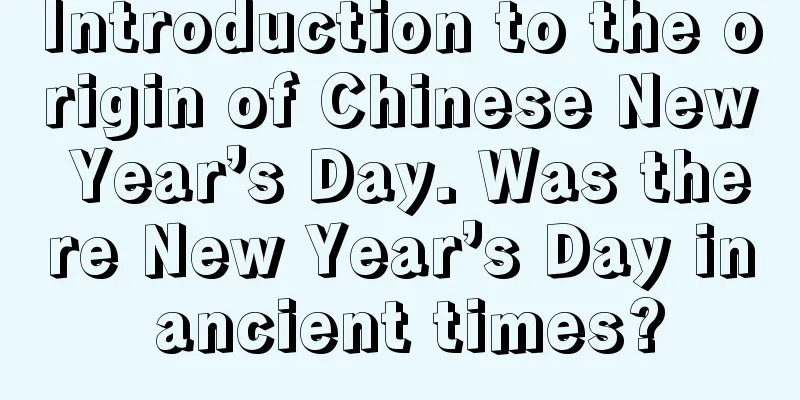Introduction to the origin of Chinese New Year’s Day. Was there New Year’s Day in ancient times?

Living in the 21st century, we generally know the date of New Year's Day, but rarely learn about its origin and history. Introduction to the origin of Chinese New Year’s Day. Was there a New Year’s Day in ancient times? The twelfth month of the lunar calendar is also known as the twelfth month, or the wax month. So what are the things to do and not to do in the twelfth month? Visit Shui Mo Xiansheng's website to learn more about the twelfth lunar month of 2019.Was there New Year’s Day in ancient China?New Year's Day in different dynasties in ancient China - the first month of the year "1" Xia Dynasty: The Xia calendar used the first month of spring as the first month "2" Shang Dynasty: The Yin calendar used the twelfth month of winter as the first month "3" Zhou Dynasty: The Zhou calendar used the eleventh month of winter as the first month "4" After Qin Shihuang unified China, he took the tenth month of winter as the first month, that is, the first day of October as New Year's Day "6" Since Emperor Wu of the Han Dynasty, it was stipulated that the first month of spring was the first month, and the first day of January was called New Year's Day, which was used until the end of the Qing Dynasty.——The New Year's Day in ancient China referred to different dates in the lunar calendar, with the first day of the first lunar month being the longest. Interpretation of the meaning of New Year's Day: The first day of the new year<br /> The "yuan" in "New Year's Day" means the beginning, which means the first. The beginning of any number is called "yuan"; "旦" is a pictograph. The "日" on top represents the sun, and the "一" on the bottom represents the horizon. "Dan" means the sun rising from the horizon, symbolizing the beginning of a day. ——The combination of the two words "yuan" and "dan" means the first day of the new year. Introduction to the Origin of Chinese New Year》——Ancient times:In ancient times, people regarded the day when Emperor Shun offered sacrifices to heaven and earth and to Yao as the first day of the new year. In the Yin Dynasty, it was the first day of the twelfth lunar month, in the Xia Dynasty it was the first day of the first lunar month, in the Shang Dynasty it was the first day of the twelfth lunar month, in the Zhou Dynasty it was the first day of the eleventh lunar month, and in the Qin Dynasty it was the first day of the tenth lunar month. After Sima Qian created the "Taichu Calendar" in the Han Dynasty, he took the first day of the first lunar month as New Year's Day, which was used until the Qing Dynasty. 》——After the Xinhai Revolution: After the Revolution of 1911, the provincial congresses of the Republic of China decided to adopt the Western calendar (Gregorian calendar), and the first day of the first lunar month was called "Spring Festival", and January 1 of the Gregorian calendar was called "New Year's Day". On January 1, 1912, the Republic of China was formally established. It was the first democratic republic in Asia and the first country in Asia to implement a republican constitutional system, with a land area of 11,418,174 square kilometers... Mr. Sun Yat-sen abbreviated the name of the Republic of China as "China". When he took office as the provisional president in Nanjing, Sun Yat-sen ended his oath of office with "New Year's Day of the first year of the Republic of China." 》——The First Chinese People's Political Consultative Conference: On September 27, 1949, the First Chinese People's Political Consultative Conference, while deciding to establish the People's Republic of China, also decided to adopt the world-wide Gregorian calendar, which we call the Gregorian calendar. New Year's Day refers to the first day of the year in the Western calendar. ——In order to distinguish the two New Years of the lunar calendar and the Gregorian calendar, and in view of the fact that the "Start of Spring" in the 24 solar terms falls around the first day of the first lunar month, the first day of the first lunar month was renamed "Spring Festival", and January 1 of the Gregorian calendar was designated as the beginning of the new year - "New Year's Day", and was included in the legal holidays, becoming a holiday for the people of the whole country. |
<<: When will New Year's Day be celebrated in 2020? What holiday is it?
>>: Where is the auspicious direction for the God of Joy on New Year’s Day, January 1, 2020?
Recommend
Are boys born in the Lesser Heat of 2021 lucky? How are their fortunes in all aspects?
People born in the fifth month of the lunar calend...
Is it not suitable to move graves on the 11th day of the twelfth lunar month in 2020? Feng Shui considerations for moving graves
Introduction: It is also necessary to choose an au...
Is the Beginning of Heat in 2019 the last day of the last dog days? Check the auspiciousness and inauspiciousness of the Beginning of Heat in 2019!
Introduction: Chushu is one of the 24 solar terms,...
When is the first snow in 2017? Where is the direction of the God of Happiness on the day of Xiaoxue?
Introduction: In our country, every day in the lun...
What are the taboos on the second day of the fourth lunar month in 2019?
Shuimoxiansheng.com has carefully compiled detail...
What should not be done on the fourth day of the first lunar month in 2021? What are the taboos on the fourth day of the first lunar month in 2021?
Introduction: Every day actually has its do’s and ...
Is November 30th of the lunar calendar in 2019 an auspicious day and suitable for worshiping ancestors?
The eleventh month of the lunar calendar is the se...
What is the date and day of the 24th day of the sixth lunar month in 2017?
The Fortune Teller website has carefully compiled...
Can we offer sacrifices on September 27th of the lunar calendar in 2018? What should we pay attention to during the sacrifices?
Introduction: Sacrifice is one of the important ev...
Only eat glutinous rice balls during the Lantern Festival? It turns out that there are these traditional foods during the Lantern Festival
Introduction: If you think that the only delicacie...
What zodiac sign will you be if you were born in the twelfth month of the lunar calendar in 2020?
What zodiac sign will you be if you were born in t...
Query of the twelve hours of the thirteenth day of the tenth month of the lunar calendar in 2019
Query the auspicious and inauspicious times at 12...
How are babies born on Laba Festival in 2020? Is their fortune good?
Introduction: The fate of children born on Laba Fe...
Is the 15th day of the 10th lunar month in 2017 an auspicious day in the lunar calendar?
Introduction: Every day is presented in different ...
Is the 29th day of the first lunar month in 2017 a good day for marriage? Can we get married?
Introduction: Marriage is a major event in everyon...









